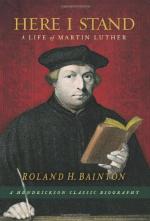
|
| Name: _________________________ | Period: ___________________ |
This test consists of 15 multiple choice questions and 5 short answer questions.
Multiple Choice Questions
1. What does Luther say about the life of a Christian?
(a) that the Christian lives in constant fear
(b) that the Christian lives not for himself, but for God and others
(c) that the Christian is free to do whatever he pleases
(d) that the Christian has the greatest chance of offending God
2. Who tells Frederick the Wise to separate himself from Martin Luther and muffle his blasphemous tongue?
(a) King Charles
(b) the German Diet
(c) Pope Leo X
(d) Pope Hadrian
3. What is the result of the Peasant War?
(a) the Pope and the Emperor are dethroned
(b) the peasants take control of the government
(c) Luther is declared governor
(d) cloisters and castles have been destroyed
4. By 1527, what is the makeup of the whole electoral of Saxony?
(a) evangelical as opposed to Catholic
(b) half and half reformers and Catholics
(c) solidly Catholic
(d) almost exclusively anti-religious
5. In what areas does Luther excel?
(a) marriage counselling and preaching on Sundays
(b) in public education and training new scribe in translation
(c) preaching sermons, translating the Bible, lecturing in class hall, and praying in the upper room
(d) in politics and bringing differing sides to the bargaining table
6. Who believes that people can come together to defend the right of each person to believe what he wants?
(a) Philip of Hesse
(b) The Augsburg Confession
(c) Emperor Charles
(d) Martin Luther
7. Why does Luther resist getting married?
(a) He thinks he is doomed to martyrdom as a heretic.
(b) He thinks he has no time for marriage.
(c) He thinks women are instruments of the Devil.
(d) He fears having children.
8. What does Luther think when Carlstadt attacks images and church music?
(a) that Carlstadt is right
(b) that Carlstadt is envious of Luther's prominence
(c) that Cralstadt is being legalistic
(d) that Carlstadt is wrong
9. What area is largely won within a decade of the Reformation?
(a) the northeast of France
(b) the British Isles
(c) most of Europe
(d) most of Northern Germany
10. What distressed Luther back in Wittenberg?
(a) that his tracts have not been published
(b) that his friends have turned against him
(c) that he is no longer relevant to the people
(d) that he is placed under house arrest
11. How does Luther travel safely?
(a) by traveling with bodyguards
(b) by traveling in a large group
(c) by traveling only at night
(d) by concealing his identity
12. With what does Luther substitute for the chants sung by priests?
(a) religious cantatas
(b) arias sung by female voices
(c) organ music by classical composers
(d) hymns sung by the congregation
13. How long does it take Luther to translate the New Testament into German?
(a) the rest of his life
(b) six years
(c) three months time
(d) two years
14. What do the peasants and the princes think of Luther after the Peasant War?
(a) Luther rises in their estimation to historic proportions.
(b) Luther is blamed by both sides.
(c) Luther is praised for helping to end the war.
(d) Luther is upheld by the peasants and hated by the princes.
15. On what occasion does Luther utter these words: "Here I stand. I cannot do otherwise. God help me. Amen"?
(a) at the end of his books
(b) on his death bed
(c) when facing his accusers
(d) taking his monastic vows
Short Answer Questions
1. What does the second Diet of Speyer do for Germany?
2. Besides sermons and pamphlets, what does Luther frequently write?
3. What does Luther mean by saying that God can forgive only a lusty sinner?
4. What does Bainton suggest about the last quarter of Luther's life?
5. To whom does Luther extend the priesthood?
|
This section contains 676 words (approx. 3 pages at 300 words per page) |

|




